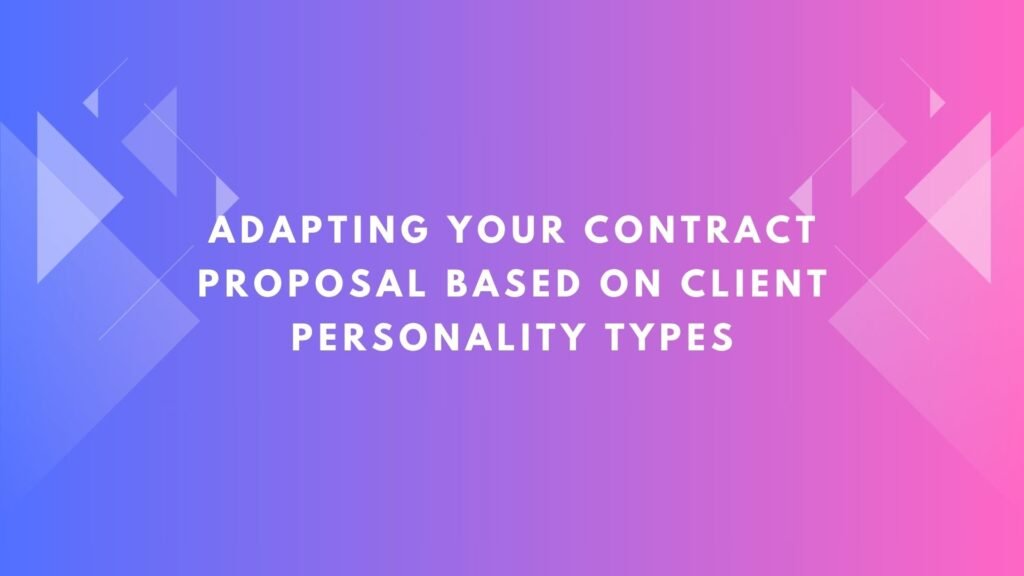When preparing a contract proposal, most professionals focus on getting the technical details right — scope of work, pricing, timelines, and terms. While these are essential, there is another factor that can greatly influence your success: understanding and adapting to your client’s personality type. Every client brings their own style of communication, decision-making, and expectations to the table. A contract proposal that aligns with a client’s personality can build trust, improve clarity, and increase your chances of winning the work. In this blog, we will explore how to recognize different client personalities and tailor your contract proposal accordingly.
Why Personality Types Matter in Contract Proposals
A contract proposal is not just a legal document. It is a communication tool. The way you present information can either make a client feel confident in working with you or leave them with doubts. By adjusting your tone, structure, and level of detail based on a client’s personality, you show that you understand their needs and respect their decision-making style. This creates a smoother path to agreement and a stronger working relationship.
Common Client Personality Types and How to Adapt Your Proposal
Let’s look at some common client personality types and how to tailor your contract proposal for each one.
1. The Detail-Oriented Client
This client loves facts, figures, and specifics. They want to understand every aspect of the project and will carefully review your proposal for accuracy and completeness.
How to adapt your contract proposal:
-
Include a detailed scope of work that outlines all tasks, deliverables, and processes.
-
Break down pricing into itemized sections rather than providing a single figure.
-
Add timelines with clear milestones and deadlines.
-
Provide references to standards or best practices where applicable.
This type of client will appreciate thoroughness and clarity. The more precise your proposal, the more comfortable they will feel signing it.
2. The Big-Picture Thinker
This client focuses on outcomes rather than details. They are more interested in the overall vision and results your work will deliver.
How to adapt your contract proposal:
-
Begin with a strong executive summary that highlights the benefits and value of your solution.
-
Use visuals like diagrams, mock-ups, or timelines to illustrate your approach.
-
Keep technical details and fine print in appendices or supporting documents so they don’t overwhelm the client.
Big-picture thinkers want to see that you understand their goals and can help achieve them without getting lost in the weeds.
3. The Fast Decision-Maker
Some clients want to move quickly. They dislike long documents and prefer clear, straightforward proposals that make it easy to say yes.
How to adapt your contract proposal:
-
Keep the document concise and focused on key points: scope, price, timeline, and terms.
-
Highlight action items, such as where to sign or how to approve.
-
Use clear, confident language that helps the client make a decision quickly.
A simple, well-organized proposal will appeal to this client’s need for speed and efficiency.
4. The Collaborative Client
This client views the contract proposal as a starting point for discussion rather than a final offer. They appreciate flexibility and openness to feedback.
How to adapt your contract proposal:
-
Present your proposal as a draft that invites input.
-
Highlight areas where you are open to adjustments, such as timeline or scope.
-
Include options where possible, for example, tiered service levels or alternative approaches.
Collaboration-minded clients will value your willingness to work together on shaping the final agreement.
5. The Cautious or Risk-Averse Client
This type of client worries about potential problems and wants to be sure that risks are managed.
How to adapt your contract proposal:
-
Include clear terms for managing changes, delays, or unexpected events.
-
Highlight insurance coverage, warranties, or guarantees that offer protection.
-
Add a section explaining how you handle quality control, compliance, or safety issues.
Showing that you have planned for contingencies helps reassure risk-averse clients.
General Tips for Adapting Contract Proposals
No matter the personality type, here are some additional ways to fine-tune your proposals:
-
Ask questions during initial meetings to get a sense of the client’s style. Pay attention to what they emphasize — details, vision, speed, collaboration, or caution.
-
Offer summaries and details. Even if a client prefers high-level overviews, include detailed sections they can review if needed.
-
Use consistent, professional formatting. No matter how you adapt the content, the proposal should look polished and easy to read.
-
Be authentic. Tailor your approach to the client, but always stay true to your values and the way you do business.
Read more: https://www.help4seo.com/contract-proposal-guide-for-photography-creative-professionals/
Conclusion
A contract proposal is more than just a formality. It is an opportunity to show clients that you understand and respect how they think and make decisions. By recognizing their personality type and adjusting your proposal accordingly, you can create a document that speaks directly to their needs, builds confidence, and makes it easier for them to say yes. Whether your client is detail-driven, visionary, fast-moving, collaborative, or cautious, taking the time to adapt your proposal will help set the stage for a successful partnership.










































